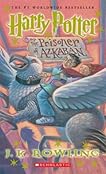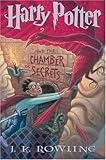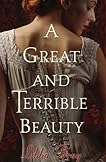 This is the first Harry Potter book I actually had to wait for. My college roommate got me Sorcerer's Stone and Chamber of Secrets for Christmas one year, and Prisoner of Azkaban was published not long after, so I was able to read books 1-3 right in a row, whereas I had to wait a year for Goblet of Fire. I remember that, on the day it was officially released, my family was on its way to Lancaster for a day trip, and I begged my father to stop at the bookstore on our way out of town so I could buy my copy.
This is the first Harry Potter book I actually had to wait for. My college roommate got me Sorcerer's Stone and Chamber of Secrets for Christmas one year, and Prisoner of Azkaban was published not long after, so I was able to read books 1-3 right in a row, whereas I had to wait a year for Goblet of Fire. I remember that, on the day it was officially released, my family was on its way to Lancaster for a day trip, and I begged my father to stop at the bookstore on our way out of town so I could buy my copy.(He was awesome and complied. This was before the midnight release parties began and which I attended for the last two books. That's a story for book 6, however.)
Okay, so I'll be honest: while I do love Harry Potter and the Goblet of Fire, I also think it's the most bloated of the Harry Potter books -- books 1-3 are more streamlined (read: shorter) and books 5-7 are, for the most part, necessarily long -- and while Goblet of Fire has numerous important storylines, there is a lot of filler that would make it a quicker, more intense read.
It's Harry's fourth year at Hogwarts, and instead of holding the annual Quidditch/House cup, the school will be hosting the Triwizard Tournament, in which three champions from three different wizarding schools compete for a thousand galleons and the glory of his or her school. This means we finally learn about two other wizarding schools in Goblet of Fire -- Beauxbatons and Durmstrang -- and meet their respective headmasters: Madame Maxine and Igor Karkaroff, both of whom contrast really delightfully with Dumbledore.
Harry isn't planning on entering the tournament -- in fact, he's looking forward to cheering on the Hogwarts champion, hanging out with Ron and Hermione, and crushing on Cho Chang from afar -- but when the Goblet of Fire spits out his name, Harry has no choice but to participate, despite the fact that he is slowly beginning to believe that someone entered him into the tournament in the hopes that it would kill him.
We meet or revisit a number of other characters in Goblet of Fire, some of whom are very significant to later books: Victor Krum, the Bulgarian Quidditch player and Durmstrang champion; Fleur DeLacour, part-veela, Beauxbatons champion, and later Bill Weasley love interest; Rita Skeeter, the queen of yellow journalism; Mad-Eye Moody, the famous Auror and newest DADA teacher; and of course, Cedric Diggory, the (true) Hogwarts champion and all-around decent guy, who suffers one of the most upsetting fates in the Harry Potter series.
(Seriously, if you can read the section where his ghost asks Harry to return his body to his parents, where Mrs. Diggory talks about how at least Cedric "died happy" while Mr. Diggory sobs in the background, where Dumbledore gives his "Remember Cedric Diggory" speech, without tearing up, you're made of stone, I tell you! I'm tearing up at I write this!
Now I feel kind of lame, but I think it's a testament to how well-drawn Cedric Diggory is. He's a fairly minor character in the grand scheme of things, but Rowling makes you feel his death profoundly. He's a genuinely good guy who dies because he refuses to claim victory in the tournament alone -- he believes Harry deserves it more and only touches the cup when Harry suggests they share it. I mean, seriously, how honorable is that? *TEAR*)
Anyway, I love the character and backstory development here as well. I was most interested in the history of the Death Eaters and the continued slow reveal of Snape's involvement with them and with Voldemort (this is, of course, especially important when you consider where Snape's storyline is going as we head into the later books). Again, it shows remarkable planning on J. K. Rowling's part -- we're slowly learning about the prophecy, about why Dumbledore trusts Snape, and so on -- which I appreciate as a re-reader.
The overarching "villainous plot" is a little convoluted (I'm not quite sure why Voldemort's faithful servant/spy couldn't have cooked up a Portkey before the third task in June), but it does offer a lot of payoff for events and characters throughout the book. Voldemort's resurrection is pretty terrifying, and the conflict that arises between the "good guys" at the end (the Ministry of Magic's refusal to believe that Voldemort has returned) is realistic and sets up book 5 well.
Ultimately, Goblet of Fire is way too long, though, and could do with a good trim (or chop, depending on how much you feel is unnecessary). I think Hermione's fight for house elf rights, while totally in character, is too drawn-out and doesn't really pay off enough in later books to warrant so much space in this one. The three tasks are also spread out so much that I feel the entire competition loses its intensity (part of me wonders, "Really? They cancelled the annual Quidditch cup for 3 tasks over 3 days out of the whole school year?").
I also think that the World Quidditch Cup scenes at the beginning of the book go on a little long, and the character of Ludo Bagman could probably be excised without too much being lost. Too, Rowling tends to offer a lot of previouslies here instead of trusting that her reader is familiar enough with the first three books and doesn't need an explanation of Hagrid's love of dangerous creatures, for example, or the entire plots of books 1-3...
Oh, and don't get me started on Voldemort's chapter-long, post-resurrection monologue (I kept imagining Syndrome from The Incredibles: "Oh, ho ho! You sly dog! You got me monologuing! I can't believe it!").
We see Harry start to grow up here, along with Hermione and (to an extent) Ron. Voldemort rises again. A major character dies. The wizarding world is at odds, as the book ends. Overall, Goblet of Fire is a solid transition between the innocence (of sorts) of books 1-3 and the darkness to come in books 5-7.
As Hagrid very wisely notes, "What's comin' will come, an' we'll meet it when it does."

















 Again, how awesome is it that my mom has good style sense so we can do things like switch shoes at work?
Again, how awesome is it that my mom has good style sense so we can do things like switch shoes at work?
